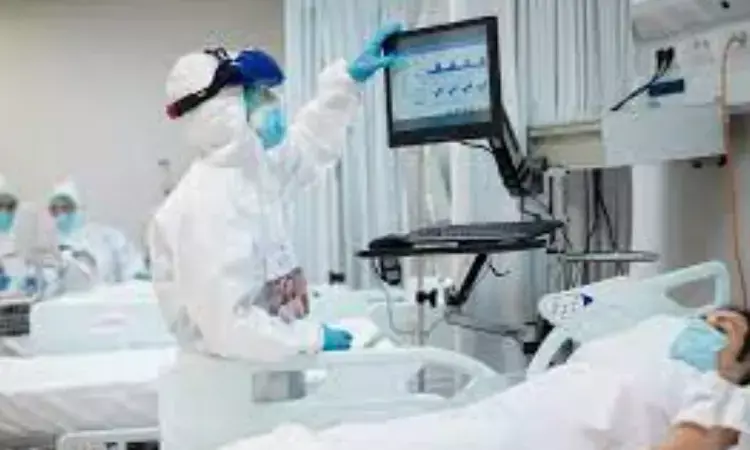- Home
- Medical news & Guidelines
- Anesthesiology
- Cardiology and CTVS
- Critical Care
- Dentistry
- Dermatology
- Diabetes and Endocrinology
- ENT
- Gastroenterology
- Medicine
- Nephrology
- Neurology
- Obstretics-Gynaecology
- Oncology
- Ophthalmology
- Orthopaedics
- Pediatrics-Neonatology
- Psychiatry
- Pulmonology
- Radiology
- Surgery
- Urology
- Laboratory Medicine
- Diet
- Nursing
- Paramedical
- Physiotherapy
- Health news
- Fact Check
- Bone Health Fact Check
- Brain Health Fact Check
- Cancer Related Fact Check
- Child Care Fact Check
- Dental and oral health fact check
- Diabetes and metabolic health fact check
- Diet and Nutrition Fact Check
- Eye and ENT Care Fact Check
- Fitness fact check
- Gut health fact check
- Heart health fact check
- Kidney health fact check
- Medical education fact check
- Men's health fact check
- Respiratory fact check
- Skin and hair care fact check
- Vaccine and Immunization fact check
- Women's health fact check
- AYUSH
- State News
- Andaman and Nicobar Islands
- Andhra Pradesh
- Arunachal Pradesh
- Assam
- Bihar
- Chandigarh
- Chattisgarh
- Dadra and Nagar Haveli
- Daman and Diu
- Delhi
- Goa
- Gujarat
- Haryana
- Himachal Pradesh
- Jammu & Kashmir
- Jharkhand
- Karnataka
- Kerala
- Ladakh
- Lakshadweep
- Madhya Pradesh
- Maharashtra
- Manipur
- Meghalaya
- Mizoram
- Nagaland
- Odisha
- Puducherry
- Punjab
- Rajasthan
- Sikkim
- Tamil Nadu
- Telangana
- Tripura
- Uttar Pradesh
- Uttrakhand
- West Bengal
- Medical Education
- Industry
Anticoagulation with heparin increases survival in moderately-ill COVID-19 patients: NEJM

Treating moderately ill hospitalized COVID-19 patients with therapeutic-dose anticoagulation with heparin increased the probability of survival.
USA: An initial strategy of therapeutic-dose anticoagulation with heparin in noncritically ill patients with Covid-19 increases the chances of survival, according to a recent study. The strategy also reduced the use of cardiovascular or respiratory organ support versus usual-care thromboprophylaxis.
The international study, published in the New England Journal of Medicine, involved 121 sites, including UT Southwestern Medical Center.
Moderately ill COVID-19 patients treated with therapeutic-dose anticoagulation with unfractionated or low molecular-weight heparin were 27% less likely to need cardiovascular respiratory organ support such as intubation, said Ambarish Pandey, M.D., Assistant Professor of Internal Medicine at UT Southwestern, who served as site investigator and co-author of the study. Moderately ill patients had a 4% increased chance of survival until discharge without requiring organ support with anticoagulants, according to the study involving 2,200 patients.
"The 4% increase in survival to discharge without needing organ support represents a very meaningful clinical improvement in these patients," said Dr. Pandey, a Texas Health Resources Clinical Scholar who specializes in preventive cardiology and heart failure with preserved ejection fraction. "If we treat 1,000 patients who are hospitalized with COVID-19 with moderate illness, an additional 40 patients would have a meaningful improvement in clinical status."
Participating platforms for the study, which defined moderately ill patients as those who did not need intensive care unit-level support, included Antithrombotic Therapy to Ameliorate Complications of COVID-19 (ATTACC); A Multicenter, Adaptive, Randomized Controlled Platform Trial of the Safety and Efficacy of Antithrombotic Strategies in Hospitalized Adults with COVID-19 (ACTIV-4a); and Randomized, Embedded, Multifactorial Adaptive Platform Trial for Community-Acquired Pneumonia (REMAP-CAP). Comparisons between the three platforms are provided in the supplementary appendix, available with the full text of the article at NEJM.org.
A parallel study in The New England Journal of Medicine found that therapeutic-dose anticoagulation did not help severely ill patients.
Reference:
The study titled, "Therapeutic Anticoagulation with Heparin in Noncritically Ill Patients with Covid-19," is published in the New England Journal of Medicine.
DOI: https://www.nejm.org/doi/full/10.1056/NEJMoa2105911
Dr Kamal Kant Kohli-MBBS, DTCD- a chest specialist with more than 30 years of practice and a flair for writing clinical articles, Dr Kamal Kant Kohli joined Medical Dialogues as a Chief Editor of Medical News. Besides writing articles, as an editor, he proofreads and verifies all the medical content published on Medical Dialogues including those coming from journals, studies,medical conferences,guidelines etc. Email: drkohli@medicaldialogues.in. Contact no. 011-43720751


